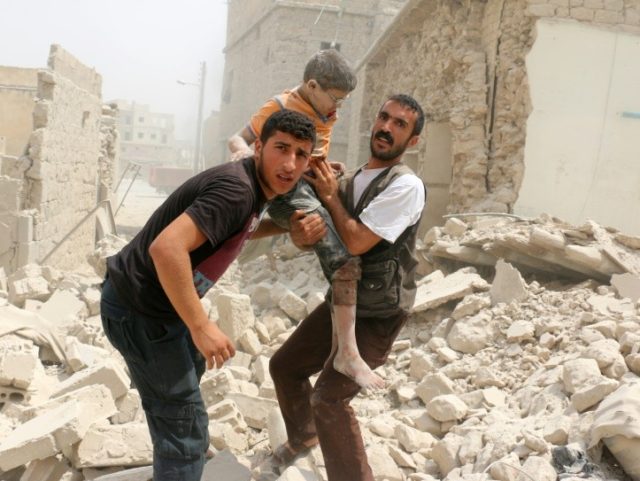Northern Syria’s Aleppo province, which has been at the epicenter of the nearly five-year-old war in the country, is a place where the Syrian regime has blatantly and repeatedly crossed President Barack Obama’s “red line” by using chemical weapons on citizens amid the ongoing carnage and chaos that has left tens of thousands of people dead and wounded.
The conflict in Aleppo may be paving the way for Syria’s next caliphate, established by a former al Qaeda affiliate that has been capitalizing on all the chaos. It is clear that Aleppo is a major component of the Syrian war.
Former New Mexico Governor and current Libertarian Party presidential nominee Gary Johnson shocked the world on Thursday when, during an interview on MSNBC Wednesday, he admitted to being oblivious about the existence of Aleppo city, the provincial capital, asking, “What is Aleppo?”
When enlightened about Aleppo, Johnson responded that he would “join hands with Russia” in their endeavors in the region.
Tens of thousands of people, including civilians and fighters from all sides, have been killed and injured in Aleppo, particularly in its capital.
The casualties have been perpetrated by the Russian- and Iran-backed regime of Syrian Dictator Bashar al-Assad, various opposition forces that include the terrorist group Jabhat Fateh al-Sham (JFS), the former al Qaeda affiliate known as the al-Nusra Front, and its rival the Islamic State (ISIS/ISIL), as well as the U.S.-led coalition, including U.S.-backed Syrian Democratic Forces (SDF), led by the Kurdish People’s Protection Units (YPG).
In just four months that ended on August 22, about 9,500 civilians were killed and wounded in Aleppo city, including women and children, by the various warring sides, according to the Syrian Observatory for Human Rights (SOHR), which monitors the conflict using sources on the ground.
The conflict in Aleppo has also displaced tens of thousands of people, fueling the Syrian refugee crisis.
According to the United Nations, 600,000 Syrians are currently living under siege with up to 300,000 trapped in the city of Aleppo alone.
Control of Aleppo province is split between the Syrian regime, the U.S.-backed SDF, other rebel factions, JFS, and to a smaller extent ISIS, which is on the run.
In the capital city of Aleppo, however, ISIS is not a player.
The major players there are those linked to Assad, the SDF, and JFS, which is capitalizing on all the chaos, prompting some analysts to say it may be the group that will benefit the most. Despite having cut its ties with JFS, al Qaeda would still profit if JFS succeeds in establishing its own Islamic State, which analysts believe would be located near Aleppo.
JFS is winning the hearts of the population in Aleppo city by fighting to protect them from an offensive launched by Assad with the help of Russia and Iran, while the United States sits on the sidelines.
Unless the United States gets involved in the defense of the eastern half of Aleppo, inaction will likely pave the way Syria’s next Islamic State, reports Foreign Policy.
Since Obama suggested in August 2012 that Assad deploying chemical weapons against its own people would constitute crossing a “red line” that would bring about consequences, the Syrian regime has repeatedly violated that threshold, particularly in Aleppo city.
Earlier this week, Assad was accused of dropping chlorine bombs on a suburb of Aleppo city, wounding at least 80 people, most of them women and children.
That attack came after the UN-backed Organization for the Prohibition of Chemical Weapons (OPCW) determined that Assad still has the capability to launch chemical weapon attacks, noting that its inspectors discovered the presence of 122 samples of chemical agents at multiple sites across Syria that were previously undeclared.
Moreover, the OPCW also concluded that Assad used chlorine in at least two separate instances — once in April 2014 and again in March 2015. The discoveries were made after Assad had agreed in 2013 to destroy all his chemical weapon stockpiles.

COMMENTS
Please let us know if you're having issues with commenting.